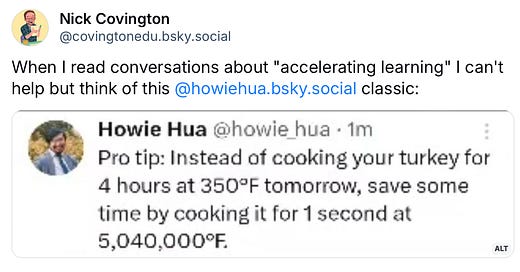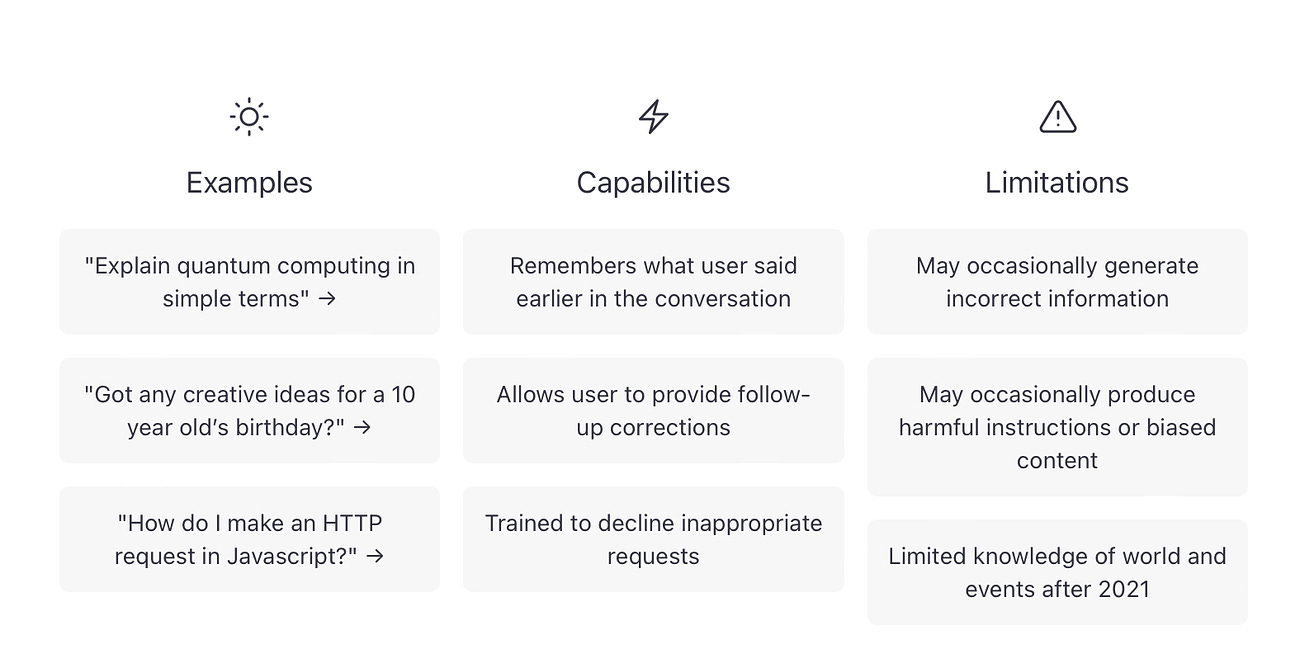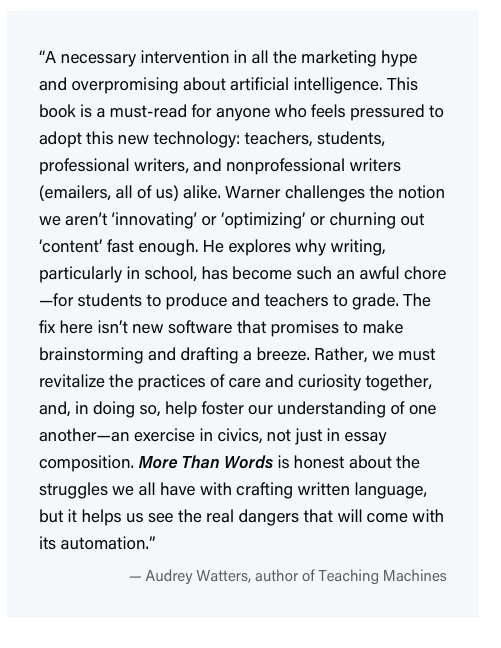This past week I came across a blog post marketing the use of AI in education that championed AI as your “thought partner” so educators can “level up” by working “faster and smarter,” and I started to despair.
I despaired because this missive came not from an edtech entrepreneur, but a former teacher who has transitioned into coaching and professional development. I expect this framing from tech companies with products to push, but I still find it a surprise coming from someone who has spent time in a classroom to wholeheartedly embrace the language of efficiency as the driving ethos of education.
The very idea that learning can or should be made more “efficient” is absurd, as illustrated by this example from Howie Hua shared by my friend Nick Covington of the Human Restoration Project:
I fundamentally believe that the existence of large language models, technology which can simulate human outputs without possessing any meaningful qualities of what it means to experience one’s humanity, suggests that we should endeavor to “do less that matters more.” If technology can churn out an imitation in seconds, surely we should be wary of behaving like the technology. When ChatGPT first appeared I declared that by itself, it could not destroy anything worth preserving. But that doesn’t mean we humans can’t do ourselves in.
I’m not wholly naive, and not even particularly idealistic. I didn’t expect the world of business and consumerism to embrace such an ethos, but it seemed at least possible that education may be able to think more deeply about why we do what we do.
Instead, we have things like Prof Jim, an AI being used by Houston schools to produce (literally) thousands of reading passages for students to study on the way to their next standardized test, which asks students to behave like automatons.
Or how about the AI-based Arizona charter school where students will spend “two hours of instruction on standard topics like language, math and science, guided by an AI that continuously adjusts the learning plan based on how the child is doing in each subject.”
For those who don’t follow the trends in tech-mediated education disruption as closely as I do, the Arizona project has whiffs of a previous attempt at “personalized learning,” Alt-School, started by an ex-Googler using $175 million in Zuckerberg seed money to establish a business model of nine schools charging $30k a year in tuition, only to still be running a deficit of $40 million annually. After five years, the whole thing imploded.
The most significant innovation of the Arizona charter school over Alt-School is that it will soak up that nice public cash and not have to worry about finding a business model.
The tragedy of this deal is that actual students will be subjected to this untested experiment, spending time you can’t get back doing stupid bullshit. In scientific research best practices, the investigators are expected to “pre-register” their hypothesis for their findings as a way of guarding against gathering a bunch of data up front and finding something novel to report on the back end. I think we should start to pre-register the people responsible for these projects and then when they fail, agree to never let them near education again.
Unfortunately, education seems to work in the opposite direction as serial failure are allowed to keep getting up the plate and taking million (and billion) dollar swings. Try Googling “Chris Whittle education scheme fraud” and look at the laundry list of failed initiatives where one guy left hundreds of others holding the bag.
Or, perhaps consider the career trajectory of Sal Khan who was recently featured 60 Minutes for the 2nd time in 12 years promising to revolutionize education without being asked about the revolution he promised a dozen years ago.
At her indispensable Second Breakfast newsletter, Audrey Watters illustrates the cultural amnesia that allows this kind of thing to happen over and over.
Anderson Cooper, the correspondent for this week's segment, does not delve deeply into the last decade-plus of Khan Academy's ed-tech revolution – on the question of, say, whether the thousands and thousands of videos watched and multiple choice quizzes taken on the platform have changed things at all, let alone for the better. “Things” could mean students’ test scores, I guess. Could mean students’ happiness. Could mean teachers’. Could mean what Khan himself has learned. But in fact, Cooper does not delve into any of that at all. Cooper does not have any follow-up questions on Khan's prior work, on the goals he stated back in 2012 for his organization: that classrooms would some day be comprised “20 to 30 students working on all different things,” moving at their own pace, with a teacher who simply "administers the chaos." Indeed today, that doesn't seem to be the goal – in all the classrooms we're shown, the students seem to be working on the same lesson, one designed (we're lead to believe at least) by the new Khan Academy AI, Khanmigo.
Given the history, given the track record, why aren’t interviews with Sal Khan fundamentally challenging, or even hostile? Why are people like Anderson Cooper willing to uncritically accept a vision for education that looks nothing like the education they benefitted from? (Cooper went to New York’s elite Dalton School before Yale.)
You don’t have to answer that, I know why. Like I said, I’m not that naive.
Lately I’m sort of wondering if what I believe to important and meaningful about things like reading, writing, learning, life, is simply, I don’t know…over?
If you think about it, something or other is always ending, and the older you get, the more things are in the rearview mirror. Most of these changes are at least arguably, for most, improvements. When I was a kid, there were three major TV networks (plus WGN - channel 9, and WFLD - channel 32 if you lived in Chicago). Do you remember apples in the 1970s? Three flavors - red, yellow, green - none of them particularly good.
And what about lettuce? If you said, Arugula? The only response you’d get is gezhundheit!
I guess we got comfortable believing that abundance was the route to prosperity and happiness. More is better, faster is better, efficiency is the north star. Of course we don’t have a culture or political structure that allows for this abundance to be distributed in anything close to an equitable fashion. There is an active campaign to re-segregate the military, elite academia, and corporate America somehow being laundered as a movement toward fairness.
I don’t want to despair, and if you don’t get mired in the bad news, you can see signs of hope. I recently gave a virtual talk to a kind of consortium of Illinois educators working on developing a program in “transitional English” that is centered on helping the kinds of students who have often been left behind by the system by valuing the development of agency and critical thinking. Lots of people are working day-to-day on the ground to make sure that students have access to meaningful experiences.
I also don’t want to think of this as a battle, or worse, a war. I don’t want to think of Sal Khan as an “enemy,” except that I’m deeply concerned about what his vision for education, a vision backed by OpenAI, a company in pursuit of developing technology that will obviate the need for humans.
I’ll be honest, it’s not clear to me what kind of resistance is required for those of us interested in preserving our humanity.
Links
This week at the Chicago Tribune I shared the first half of my Biblioracle Book Awards for Fiction, featuring books I’d already written about at some point or another.
At Inside Higher Ed I wrote about a new book, The Present Professor, and how being present is a great antidote to the sense that we should endlessly be pursuing speed and efficiency.
The National Book Critics Circle has revealed its longlists for fiction, nonfiction, autobiography, criticism, and other categories.
Via McSweeney’s from Tom Smyth, “I Am Whoville’s Only Home Insurance Provider, and I Am So Screwed.”
Recommendations
1. Birds of America by Lorrie Moore
2. The Fall by Albert Camus
3. Blood Meridian by Cormac McCarthy
4. Mrs. Dalloway by Virginia Woolf
5. The White Album by Joan Didion
Maisie S. - New York, NY
That’s a list of some pretty iconic books. I’m going to recommend one that should be iconic, Oreo by Fran Ross.1
More Than Words: How to Think About Writing in the Age of AI is my attempt at making an affirmative case of the inherent value of making space to read and write without worrying about speed and efficiency.
Regular readers may notice that today’s newsletter is arriving a bit late and a tad truncated. That’s courtesy of a little holiday season norovirus!
Stay vigilant, my friends.
John
The Biblioracle
All books (with the occasional exception) linked throughout the newsletter go to The Biblioracle Recommends bookstore at Bookshop.org. Affiliate proceeds, plus a personal matching donation of my own, go to Chicago’s Open Books and an additional reading/writing/literacy nonprofit to be determined. Affiliate income for this year is $164.60.







Really appreciated all the bits and bobs here - I agree that Oreo by Fran Ross is amazing and should be much better known! I cackled so often reading it.
And your review of The Present Professor was helpful and I’ve added it to my lists. This last semester, I’ve been repeating a mantra to myself as I wander around campus and get to and from my classes: “Be present. Be open. Be engaged.” I’m confident I am not going to be an expert teacher of composition despite my years of experience - I don’t think that’s even a goal worth having. Writing is not about expertise, it’s much more about all of us being open to what writing can do - as well as being present to what real relationships and communication can do. That approach is also much more fun!
Thank you for this column and for your other writing.
In K12 land the insistence on AI makes me want to puke. Our students are neither literate nor computer literate, but let's worry about AI literacy.
I don't mind praising it when praising is due. It has uses. (I'm no Luddite.) But goodness.
Thanks as always for the thoughtful read!